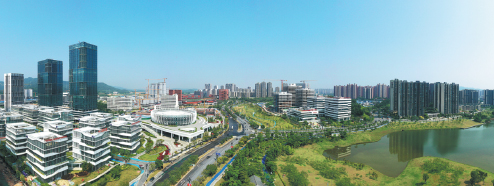CSGKC grows into highland for knowledge economy
How long will it take for 8.08 square kilometers of farmland to grow into a 232-sq-km national-level innovation center with many global leading enterprises?
Ten years, according to the China-Singapore Guangzhou Knowledge City in South China's Guangzhou, the capital of Guangdong province.
On March 13, 2012, when Ascendas OneHub GKC, the first industrial incubation project in the knowledge city broke ground, the CSGKC was on a mission to be a world-leading innovation hub.
Today, it has become a modern boomtown with spaces for production, living and ecological development harmoniously laid out.
This year, 186 projects with a total investment exceeding 300 billion yuan ($41.67 billion) are under construction in the knowledge city. Accumulatively, 24,000 entities have been registered with the CSGKC over the past 10 years with total registration capital of nearly 500 billion yuan.
Milestones of development
In July 2016, the State Council approved the CSGKC to be a pilot zone for intellectual property rights protection and reform. The knowledge city was set to be an innovation-centered hub with effective IP protection mechanisms and to explore ways for China to further boost the development of intellectual property rights.
The CSGKC was upgraded in 2018 to be a national-level bilateral cooperation project between China and Singapore.
A bird's-eye view of China-Singapore Guangzhou Knowledge City, which has become an innovation hub in Guangdong province. CHINA DAILY
Linking global resources
Beginning as an international cooperation project, the CSGKC has long been committed to promoting opening-up in China.
The China-Singapore Smart Park of the CSGKC, focusing on the digital economy, green development, biomedicine and smart city construction, opened in June this year, marking a new milestone in Sino-Singaporean cooperation.
The China-Singapore International Joint Research Institute set up its headquarters in the smart park and attracted more than 60 industrial and business projects, including SP Group and NCS China. With an investment of more than 1.4 billion yuan, the smart park has 12 buildings with major functions featuring demonstration and exchange spaces, industrial incubation and acceleration rooms and residential facilities.
The opening of the smart park marked the CSGKC's new round of development: entry into the stage of more diversified development in the future, said Xu Hui, deputy director of the collaboration affairs office of the CSGKC.
The CSGKC has been deepening cooperation with partners from Singapore in fields including advanced manufacturing, intellectual property protection and talent cultivation. More than 60 cooperation projects were signed to support the development of the Guangdong-Hong Kong-Macao Greater Bay Area and to cement the relationship between China and the 10 ASEAN member states.
Looking ahead, the CSGKC is keen to strengthen partnerships with Singapore in the medical sector and explore future business growth opportunities arising from the Regional Comprehensive Economic Partnership agreement in relevant fields.
As the only region of its type in China which puts patent, trademark and copyright creation, application and protection under one roof, the CSGKC is accelerating its bid to be a globally influential national-level knowledge center, with IP services leading the way.
In April, the IP service center of the CSGKC opened to the public to provide services such as advice, application and communication. The center boasts 10 overseas service providers and 20 domestic service providers, covering the entire IP industrial chain.
In May, the China National Intellectual Property Administration approved three foreign IP service agencies to set up representative offices in China. Two of the three are in the knowledge city. On Sept 1, Novartis became to the first foreign IP service agent to complete registration in China.



 Print
Print Mail
Mail


